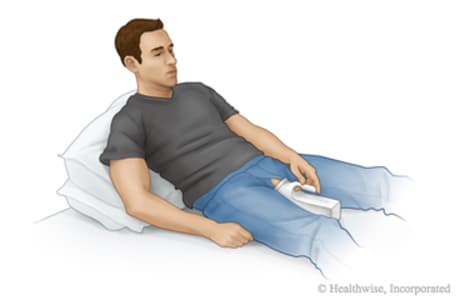Caregiving: Using a Bedpan or Urinal
Getting Started
If the person you're caring for is not able to leave their bed to go to the bathroom, they may need to use a bedpan or urinal.
- A bedpan is a container used to collect urine or feces, and it is shaped to fit under a person lying or sitting in bed. Bedpans can be made of plastic or metal, and some can be used with liners to prevent splashing and make cleaning easier.
- A urinal is a container used to collect urine and is made for either male or female anatomy. But some people might find it easier to use a bedpan.
If you are helping someone with a bedpan or urinal, try to be relaxed. If you are calm and don't seem embarrassed, the person may feel more comfortable.
How to help with a bedpan
Start by gathering supplies. You will need a bedpan, gloves, and toilet paper or wet wipes. A pad to protect the bed is also helpful. Make sure you have a place to set the bedpan aside while you help with wiping or getting dressed.
Wash and dry your hands well, and put on gloves. If you can, place a bed pad under the bedpan for spills.
Have the person you're caring for take down their pants and underwear, and help if needed. Cover them with a sheet or blanket for privacy.
Help get the bedpan into position.
slide 1 of 2
slide 1 of 2, Help get the bedpan into position.,
To position the pan:
- Have the person sit up or lift up the hips slightly, and then slide the bedpan under the person. Or if you have a helper, help the person lift the hips as your helper slides the bedpan under the person's buttocks.
- Or you can help the person turn to the side. Gently press the bedpan against their bottom, and then help them turn back onto the bedpan.
If you can leave the person alone safely, leave the room to give privacy. Check on the person often so the bedpan and bed pad can be removed soon after use.
Remove the bedpan carefully when the person is finished.
slide 2 of 2
slide 2 of 2, Remove the bedpan carefully when the person is finished.,
-
Hold the bedpan in place and help the person roll off of it, away from you. Carefully set the bedpan to the side.
-
Help the person wipe if needed.
-
Empty the bedpan into the toilet.
-
Rinse and wash the bedpan using a disinfectant diluted with water. It may help to use a small sprayer that attaches to the toilet water supply. Dry the bedpan or let it air-dry.
-
Take off your gloves and throw them away.
How to help with a urinal

- Gather the supplies. You will need a urinal, gloves, and toilet paper or wet wipes. Make sure you have a place to set the urinal aside while you help with wiping or getting dressed.
- Wash and dry your hands well, and put on gloves. Have the person you're caring for lower or unzip their pants. Offer help if needed.
- Ask the person to position the urinal so urine will flow into it. If needed, help them spread their legs and position the urinal. If the person needs help, hold the urinal in place while they urinate.
- Cover the person with a sheet or blanket for privacy, if possible. If you can leave them alone safely, leave the room to give more privacy.
- When the person is done urinating, carefully remove the urinal.
- Help the person wipe if needed. If wiping the vulva, be sure to wipe from front to back. If you use a wet wipe or a washcloth, dry the area between the person's legs after wiping.
- Empty the urinal into the toilet.
- Rinse and wash the urinal using a disinfectant diluted with water. Dry the urinal or let it air-dry.
- Take off your gloves and throw them away. Wash your hands again with soap and water.
Credits
Current as of: November 16, 2023
Current as of: November 16, 2023